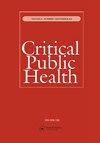Can White allyship contribute to tackling ethnic inequalities in health? Reflections on the experiences of diverse young adults in England
IF 2.3
3区 医学
Q2 PUBLIC, ENVIRONMENTAL & OCCUPATIONAL HEALTH
引用次数: 1
Abstract
ABSTRACT Ethnic diversity and racism have not featured strongly in English research, policy or practice centred on understanding and addressing health inequalities. However, the COVID-19 pandemic and the Black Lives Matter movement have shone fresh light on deep-rooted ethnic inequalities and mobilised large segments of the population into anti-racist demonstration. These recent developments suggest that, despite strong counterforces within national government and the mainstream media, there could be a shift towards greater public awareness of racism and potentially a willingness to take individual and collective action. This paper addresses these developments, and specifically engages with the contested notion of ‘allyship’. We bring together the experiences of 25 young adults living across England and prior literature to raise questions about whether and how racialized White individuals can play a role in dismantling systemic racism and reducing ethnic inequalities in health. Our analysis reveals a variety of complexities and obstacles to effective and widespread allyship. Findings suggest the need to nurture contingent, responsive and reflexive forms of allyship that can attend to the harms inflicted upon racially minoritized people as well as push for systemic transformation. White allyship will need to take a variety of forms, but it must be underpinned by an understanding of racism as institutional and systemic and a commitment to tackling interlocking systems of oppression through solidarity. The issues addressed are relevant to those occupying public health research, policy and practice roles, as well as members of the public, in England and other multi-racial settings.白人同盟能帮助解决健康方面的种族不平等吗?对英国不同年轻人经历的反思
在以理解和解决健康不平等为中心的英语研究、政策或实践中,种族多样性和种族主义并没有很强的特色。然而,2019冠状病毒病大流行和“黑人的命也重要”运动为根深蒂固的种族不平等现象提供了新的视角,并动员了大量人口参加反种族主义示威。这些最近的事态发展表明,尽管国家政府和主流媒体内部有强大的反对力量,但公众对种族主义的认识可能会有所提高,并可能愿意采取个人和集体行动。本文讨论了这些发展,并特别涉及有争议的“盟友关系”概念。我们汇集了生活在英格兰各地的25名年轻人的经历和之前的文献,提出了关于种族化的白人是否以及如何在消除系统性种族主义和减少健康方面的种族不平等方面发挥作用的问题。我们的分析揭示了有效和广泛的盟友关系的各种复杂性和障碍。研究结果表明,有必要培养偶然的、反应迅速的、反射性的盟友关系,以应对对少数族裔造成的伤害,并推动系统性变革。白人盟友关系需要采取多种形式,但其基础必须是理解种族主义是制度性和系统性的,并承诺通过团结解决相互关联的压迫系统。所讨论的问题与那些在英国和其他多种族环境中担任公共卫生研究、政策和实践角色的人以及公众成员有关。
本文章由计算机程序翻译,如有差异,请以英文原文为准。
求助全文
约1分钟内获得全文
求助全文
来源期刊

Critical Public Health
Multiple-
CiteScore
5.90
自引率
7.10%
发文量
36
期刊介绍:
Critical Public Health (CPH) is a respected peer-review journal for researchers and practitioners working in public health, health promotion and related fields. It brings together international scholarship to provide critical analyses of theory and practice, reviews of literature and explorations of new ways of working. The journal publishes high quality work that is open and critical in perspective and which reports on current research and debates in the field. CPH encourages an interdisciplinary focus and features innovative analyses. It is committed to exploring and debating issues of equity and social justice; in particular, issues of sexism, racism and other forms of oppression.
 求助内容:
求助内容: 应助结果提醒方式:
应助结果提醒方式:


